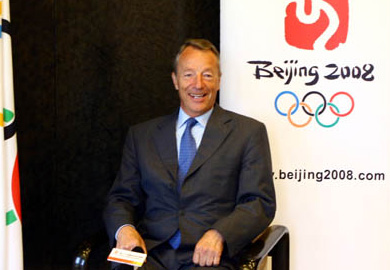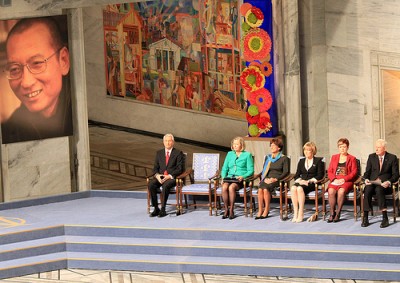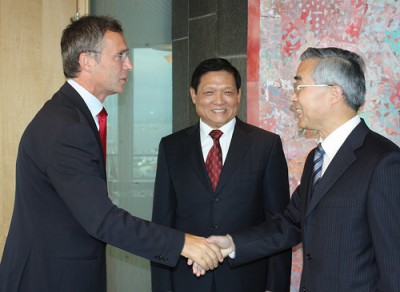A new Nobel Peace Prize was awarded in Oslo on Friday but Norway is still feeling the ill effects of last year’s prize to Chinese dissident Liu Xiaobo. Ongoing conflict between Norway and China over the prize continues to raise questions about the composition of the Norwegian Nobel Committee.

Last year’s prize so angered Chinese authorities that newspaper Dagens Næringsliv (DN) has reported that the only Norwegian top Chinese politicians will talk to now is Gerhard Heiberg, retired businessman and longtime member of the International Olympic Committee (IOC). He thinks it’s time the source of the conflict was addressed.
Heiberg, age 72, has remained in China’s good graces, likely because of his powerful position on the IOC and because Heiberg criticized the Nobel Committee’s decision to award last year’s Peace Prize to dissident Liu Xiaobo. Heiberg, according to newspaper Aftenposten, had even warned the staunchly independent Nobel committee against awarding the prize to Liu.
In the year since, relations between China and Norway have gone into a deep freeze. China has cancelled high-level meetings and political talks, indefinitely suspended negotiations on a free-trade treaty and often refused to issue visas to visiting Norwegians. The Norwegian government, meanwhile, has refused to apologize in any way for the Peace Prize on the grounds the government has nothing to do with the prize selection process. That, it points out, is up to the Norwegian Nobel Committee.

Since the committee is appointed by the Norwegian Parliament under the terms of Alfred Nobel’s will, though, the Chinese refuse to distinguish Nobel committee policy from government policy. That’s given rise to the renewed debate over how the parliament appoints the committee, and Heiberg agrees that’s a source of the conflict with China.
“The problem is that believing that the Nobel Committee is independent of Norwegian authorities is like believing in Santa Claus,” Heiberg told newspaper Dagens Næringsliv (DN) late last week. “When the Nobel Committee leader (currently Labour Party veteran Thorbjørn Jagland) has been president of the parliament, foreign minister and prime minister, it’s difficult to view the Peace Prize as disconnected from Norwegian politics. And when no Norwegian politician has criticized a prize, but praises it in unison every year, it just strengthens the connection.”

That’s exactly what occurred this year as well, when politicians from Prime Minister Jens Stoltenberg to the former head of the Christian Democrats, Dagfinn Høybråten, praised the committee’s decision after the latest prize was announced Friday morning. Stoltenberg went so far as to tell reporters on Friday that this year’s prize to three women from Liberia and Yemen was in line with Norwegian policies encouraging women’s rights. Winner Ellen Johnson Sirleaf, he added, is “a friend of Norway.”
That doesn’t do much to distance the Norwegian government from the Norwegian Nobel Committee, and Heiberg has said he understands why the Chinese won’t disconnect the prize to Liu from Norwegian government policy. Heiberg claims they remain as angry now as they were a year ago. Recent visits to China by Crown Prince Haakon and Oil & Energy Minister Ola Borten Moe in connection with international gatherings are no indication that relations are thawing, Heiberg claimed. The visits “didn’t move the situation a single millimeter in the right direction,” Heiberg told DN.
Expecting a Norwegian initiative
Heiberg said the Chinese view him as “a friend of China, not as a Norwegian,” so his relations have remained intact. He has a broad network of contacts within China, up to the highest levels of politics and government, and Heiberg revealed that he has reported back to Norwegian officials after various meetings.
“The Chinese expect a Norwegian initiative, an offer of cooperation on several fronts despite the Peace Prize,” Heiberg told DN. The offer, he said, must be communicated publicly in a way that both Norwegians and Chinese will understand that Norway is showing more humility towards China. Heiberg said he has made it clear to the Chinese that the Norwegian government will never apologize for the Peace Prize, but it should be possible to find a formulation that the government can accept.
Heiberg contends that unless a solution to the conflict is found, relations between China and Norway will continue to deteriorate. “Norway is more dependent on China than China is on Norway,” he claims. “I can’t understand that we are well-served with having such ice-cold relations with a country that may be the world’s most powerful in a few years.”
Other Peace Prize watchers think relations between China and Norway will normalize over time. “The Chinese lost face, they must punish Norway for a certain period, then it will go over,” Kristian Berg Harpviken told foreign journalists in Oslo last week. Heiberg clearly doesn’t agree.
Change the committee’s composition
He did agree that the Peace Prize must continue to recognize champions of human rights, but the committee deciding on a winner needs to be further removed from Norwegian politics. Today its members are mostly former politicians, selected by their parties to reflect the current political make-up of the parliament.
Jagland has defended the current composition of the committee and sees no reason to change it. Heiberg can’t understand that Jagland doesn’t see the need to discuss a change. “I think I travel around the world as much as Jagland, and most foreigners I meet view the Peace Prize as an indication of Norwegian politics,” he said, giving further support to the Chinese view. He added, though, that it’s entirely possible to be critical of China without getting into conflict.
A spokesman for Norway’s foreign ministry wouldn’t comment on Heiberg’s role in the conflict between China and Norway. “The ministry is working along several lines to get good relations with China, but we don’t want to go into more detail about them,” Bjørn Jahnsen of the ministry told DN. “China also has an important responsibility for this.”
Views and News from Norway/Nina Berglund
Join our Readers’ Forum or comment below.
To support our news service, please click the “Donate” button now.

